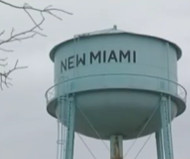Article from: www.thenewspaper.com/news/64/6420.asp
3/13/2018
Ohio Town Cannot Survive Without Speed Camera Revenue
Monetary concern drives New Miami challenge to speed camera ruling before the Ohio Supreme Court.
 The village of New Miami told the Ohio Supreme Court last week that its "fiscal integrity" would be compromised if a lawsuit succeeds in stopping the use of speed cameras. In January, the state Court of Appeals sided with motorists who challenged the constitutionality of the one-square-mile speed trap town's photo radar program (view ruling). To avoid paying the resulting $3 million in refunds, New Miami is begging the high court for relief.
The village of New Miami told the Ohio Supreme Court last week that its "fiscal integrity" would be compromised if a lawsuit succeeds in stopping the use of speed cameras. In January, the state Court of Appeals sided with motorists who challenged the constitutionality of the one-square-mile speed trap town's photo radar program (view ruling). To avoid paying the resulting $3 million in refunds, New Miami is begging the high court for relief.
"The village now faces financial ruin should the Twelfth District's overly restrictive reading of the sovereign immunity statutes be allowed to stand, and the matter proceed to final judgment," New Miami attorney James J. Englert wrote.
The lower courts found New Miami's automated ticketing program unconstitutional because vehicle owners had no realistic opportunity to defend themselves against the $180 demand that they received in the mail. New Miami insists that it cannot be held liable, even for unconstitutional actions, because it is protected by sovereign immunity. The appellate and lower court judges disagreed, saying refunds were appropriate as restitution for unlawful actions. The village repeated arguments that had failed in the lower courts.
"The purported equitable restitution exception to immunity is not applicable here and should not be allowed to push a municipality into bankruptcy when exercising its core governmental function of regulating traffic speed to ensure safety and exercising quasi-judicial determination of civil liability for traffic violations," Englert wrote.
The photo radar program created unique problems for the town. Most of the typical legal problems a local government faces, such as discrimination or workplace injury lawsuits, are covered by insurance. Constitutional violations are not.
"Since the core governmental acts under which the lower courts have held the village liable do not constitute the typical ministerial or proprietary functions that are exceptions to the general grant of immunity, there is no insurance available to protect the village from ceasing operations," Englert wrote.
The biggest problem of all is that the town cannot afford to pay back any court-imposed judgment.
"In this case, Optotraffic received the automated speed enforcement program fines purportedly paid by the plaintiffs, and Optotraffic allocated the money in accordance with a contract between the village and Optotraffic, such that 40 percent of the funds collected by Optotraffic were retained by Optotraffic, and the remaining 60 percent of the funds were sent from Optotraffic to the village," Englert explained. "The only fund held by the village is, at most, 60 percent of the automated speed enforcement program fines paid by the plaintiffs."
There is no guarantee that the state Supreme Court will be interested in taking the case. The justices denied the village's request at an earlier stage in the proceedings.
 The village of New Miami told the Ohio Supreme Court last week that its "fiscal integrity" would be compromised if a lawsuit succeeds in stopping the use of speed cameras. In January, the state Court of Appeals sided with motorists who challenged the constitutionality of the one-square-mile speed trap town's photo radar program (view ruling). To avoid paying the resulting $3 million in refunds, New Miami is begging the high court for relief.
The village of New Miami told the Ohio Supreme Court last week that its "fiscal integrity" would be compromised if a lawsuit succeeds in stopping the use of speed cameras. In January, the state Court of Appeals sided with motorists who challenged the constitutionality of the one-square-mile speed trap town's photo radar program (view ruling). To avoid paying the resulting $3 million in refunds, New Miami is begging the high court for relief.